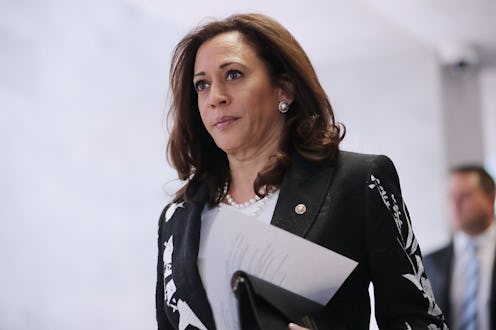News
What You Should Know About Bernie Sanders' "Medicare For All" Bill

Vermont Sen. Bernie Sanders' upcoming single-payer health care legislation just gained another backer. California Sen. Kamala Harris will co-sponsor the Medicare-For-All bill, she announced on Wednesday at a town hall in Oakland. Harris stands among other high-profile Sens. Elizabeth Warren, Kirsten Gillibrand, and Corey Booker who support a single payer system, but Harris is the first senator to publicly support Sanders's current proposal, which is planned for an early September release.
In the proposed legislation, Medicare — the federal health insurance plan that covers all Americans over 65 — would be extended to all residents. A single-payer health care system, where the government covers all residents under a tax-funded health insurance plan, is one of the various ways to achieve universal healthcare. This differs from how the Obamacare system works. Obamacare, nickname for the Affordable Care Act, broadens previous government-mandated coverage, but does not provide universal healthcare. Furthermore, it doesn't operate as an equal access, single payer health care system. Obamacare coverage, which targets people who don't get insurance through an employer, is divided into four tiers based on how much you can afford.
In the lead-up to the 2016 primaries, Hillary Clinton criticized Sanders's health care plan and overall, leftists and centrists within the Democratic Party disagree on the Medicare-for-all concept. But the idea has gained momentum among Democrats in Congress since the election and Obamacare repeal scare.
Despite growing support, the Democratic Party remains far from united on the issue. Party Leader Sen. Chuck Schumer told ABC News that single-payer health insurance is on the table, but has not voiced an opinion on Sanders' bill. And in an exchange with Vox reporter Jeff Stein, Sen. Ben Cardin said properly tending to Obamacare could lower the number of people uninsured and that a centrist approach is a better strategy to winning broader support.
Health care is the leading cause of bankruptcy in the United States and while Democrats disagree with how to improve the health care system, they do agree that it must be improved somehow — by either expanding Obamacare or detailing a new plan.
If legislation were to pass, the United States would be one significant step closer to joining Canada, Argentina, Japan, and virtually all of Europe on the list of countries that have universal health care. It's unlikely to happen anytime soon, however. With the Republican Party controlling both chambers of Congress, in addition to mixed support from the Democratic Party, the single-payer health care program has little chance to become law.